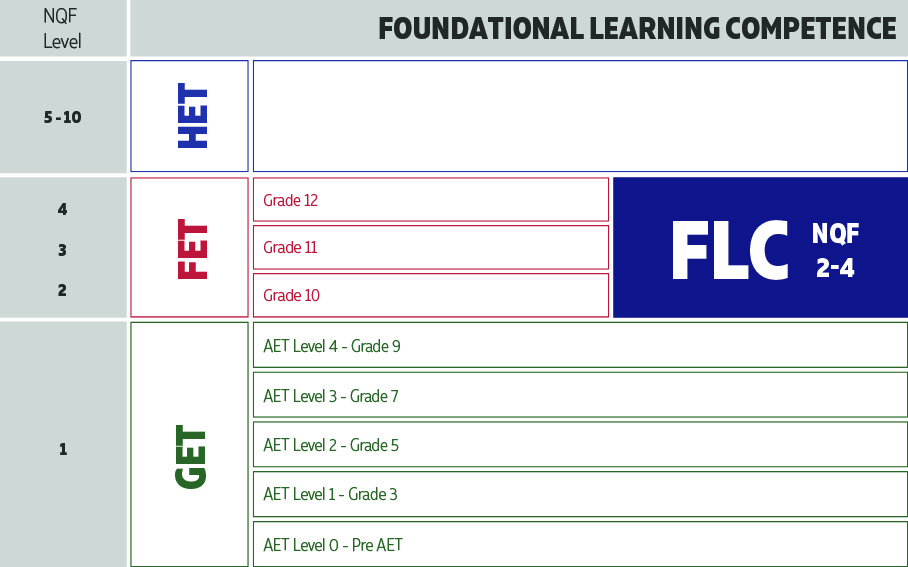Back in 2010, the IEB (Independent Examinations Board) implemented Foundational Learning Competence or FLC for short. They believed it necessary because there was a clear need for a higher level of skill in fundamental proficiency among the South African workforce. And so FLC was designed and implemented to address this critical shortage.
For the employee, the skills gained in Communications in English and Mathematical Literacy have proven foundational for an employee wanting to improve and progress in their workplace. Their ability to communicate effectively is closely linked to their success in learning. They often find it near impossible to understand theoretical concepts and learning new skills and abilities for their working environment proves all but impossible to achieve.

FLC supports the objectives of the National Qualifications Framework (NQF) with regards to the fundamental unit standards’ intent of redress, access to quality education, the achievement of qualifications and forming the basis and culture of lifelong learning.
Thus, FLC was designed and implemented as a part qualification (SAQA 88895), consisting of two learning areas, Foundational Mathematical Literacy and Foundational Communications in English. It determines the minimum level of competence required for anyone who wishes to do an occupational qualification (e.g. Learnership) and for the optimal functioning of a person in his or her workplace. Put in another way, FLC is intended to address the skills and proficiency needed for workplace learning across the Further Education and Training (FET) band.
FLC is the next step after AET in terms of the National Qualifications Framework. What this means is that the learner or worker must first have completed or proven competence in AET Level 4, both English and Mathematics, before they can start FLC.
- Umalusi certified statement of results in both English and Mathematics (Level 4), and;
- An IEB Readiness Assessment.
What is the focus of FLC Communications in English?
Communications in English is developed to enable the worker in being able to read, write, speak with confidence, listen and understand so that he or she can function to their potential within the working environment and to cope with further learning. Further learning may include occupational qualifications, but it may also mean industry or company-specific material and or assessments.
What is the focus of FLC Mathematical Literacy?
Mathematical Literacy in this context focuses on the use of and the worker’s ability to grasp mathematical ideas and the application of mathematics in their working environment, at different levels of difficulty and complexity. What this may mean in layman terms is that the worker, where previously unable to calculate totals during a stocktake for example, now can take an active role in performing such tasks, and even more difficult tasks, within the company or workplace.
How long does it take to complete FLC?
It is always difficult to place a set amount of time on the duration of a Training Programme. The reasons are rather simple. The ability of the learners and how the programme is delivered are chief among these. A programme delivered full-time will be substantially quicker to complete as opposed to a programme on a part-time basis. A worker with a high level of proficiency and who attends regularly and applies themselves will also complete the programme sooner.

- Writing,
- Speaking and Listening,
- Visual literacy,
- Language structure and usage,
- Study skills and,
- Workplace terminology.
Communication in English provides the knowledge and ability in the use of language as well as the thinking processes needed to communicate properly in the working environment.
FLC Mathematical Literacy consists of:
- Numbers and quantity,
- Finance,
- Data and chance,
- Measurement,
- Space and shape and,
- Patterns and relationships.
Mathematical literacy provides the worker with the ability to solve problems. In solving problems, the person will learn about sorting, comparing, counting, estimating, computing, measuring, modelling, interpreting and communicating. This will enable them to make sense of the workplace and the world they live in.
And what are the entry requirements?
Those workers or employees who are competent at AET Level 4 in English and or Mathematical Literacy should be able to start and complete an FLC programme successfully. AET Level 4 or it’s equivalent in English and or Mathematical literacy are learning that is assumed to be in place before starting an FLC programme.
It is noteworthy to mention that placing a person at a level too high for them to cope with, is extremely demoralising. It places extreme strain on the facilitator and endangers the success of the programme.
It is good practice to have employees undertake a placement assessment before making any decisions regarding training. The placement assessment will determine the level of the learning programme into which a worker should be placed. These assessments ensure that the demands of the learning programme correspond with the employee’s level of proficiency.
FLC and the external summative assessment
The external summative assessment is a proficiency assessment designed to test the employee’s skill level and whether the said employee should have access to further occupational learning.
The learning areas are assessed separately and each of these assessments takes approximately 150 minutes to complete. It consists of 60 multiple-choice questions and conducted at the employee’s place of work by an IEB representative.
Foundational Learning Competence may also be achieved through Recognition of Prior Learning (RPL). This is accomplished by writing the external summative assessment, without going through the FLC learning programme, and being found competent. Such persons will receive the credits for FLC and may then go on to further their education with occupation qualifications.
Sources: http://www.qcto.org.za/